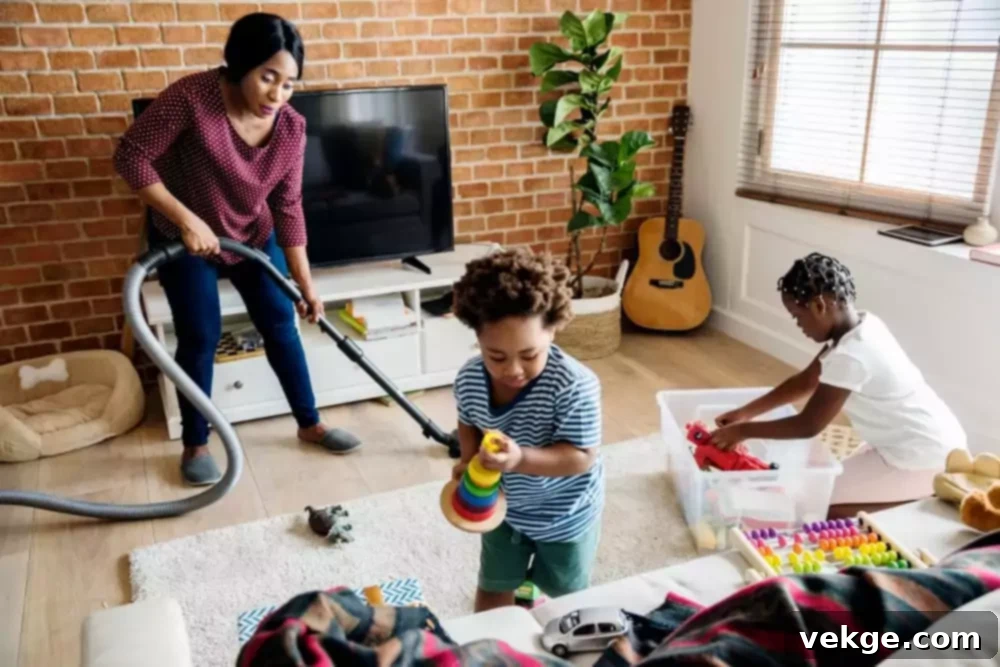Transform Your Home & Mind: Essential Tips for a Consistently Clean and Organized Space
Your living environment profoundly influences your health, productivity, and mental well-being. A clean and organized home isn’t just aesthetically pleasing; it’s a foundation for a healthier, less stressful life. The benefits of maintaining a tidy space are vast and truly transformative, touching every aspect of your daily existence.
Beyond the immediate visual appeal, a decluttered and well-maintained home can significantly improve your physical health. Reducing visual clutter and tidying up can subtly contribute to a feeling of greater control and even positively impact lifestyle choices, potentially aiding in weight management and promoting clearer skin by reducing stress. More importantly, when your home is regularly cleaned, the indoor air quality dramatically improves. This is crucial for everyone but especially beneficial for those susceptible to asthma or allergies, as a clean home minimizes dust, pet dander, and other airborne irritants. Furthermore, a perpetually messy environment can be a source of constant low-level stress and anxiety, particularly for children, affecting their mood and ability to focus. Even if the thought of dedicating entire weekends to cleaning seems daunting, understanding these profound benefits can motivate you to integrate simple, effective habits into your routine.
Whether you reside in a compact apartment or a spacious house, achieving a consistently clean home without sacrificing all your free time is entirely possible. This comprehensive guide will walk you through actionable strategies to keep your space immaculate, leaving you ample time to pursue activities you truly enjoy.
Embrace a Realistic Mindset for Sustainable Home Cleanliness
It’s natural to desire a pristine home, and expecting your family to contribute to its tidiness is reasonable. However, harboring unrealistic expectations can often lead to disappointment. Cleaning is rarely a one-time, monumental task that, once completed, stays done forever. Instead, it’s a dynamic, ongoing process. Your home is a living space, constantly accumulating dust, dirt, and new items. This continuous cycle means that a truly “finished” state of cleanliness is a myth; rather, it’s about maintaining a comfortable and functional level of order.
Adopting a mindset that embraces regular maintenance as the cornerstone of a tidy home is essential. Daily dusting, weekly vacuuming, and routine mopping are not burdens but consistent efforts that prevent overwhelming messes from forming. When faced with a daunting amount of tidying, remember that the mess will eventually be addressed. Stressing excessively over it only depletes your energy and changes nothing about the current state. Cultivating patience and a methodical approach will serve you far better than succumbing to anxiety.
If your home feels like an insurmountable mess and the thought of tidying it up is beyond your current capacity, it’s time for a significant mindset shift. Without it, clutter will inevitably build up again, even after a recent clearing session. Begin by setting clear boundaries around what comes into your home, especially when shopping. Regularly reassess why you hold onto certain items, asking yourself if they genuinely add value or joy to your life. Most importantly, establish a structured routine for housework that is both manageable and sustainable for you and your family. Break down larger tasks into smaller, more achievable steps.
While it can be tempting to mentally list every single task that needs completion, this often leads to feeling overwhelmed and losing all enthusiasm before you even begin. Instead, practice single-tasking. Focus on one small, satisfying cleaning task at a time. This approach not only leads to better performance and higher quality work but also builds momentum and a sense of accomplishment, encouraging you to continue without feeling drained. Start small – perhaps just clearing one surface or organizing one drawer – and let these small victories fuel your progress.
Cultivate a Clutter-Free Environment Throughout Your Home

One of the most common reasons homes become disorganized is simply having too much stuff. To maintain a reasonably ordered home, the fundamental principle is: everything needs a designated place. This means establishing clear homes for common items like shoes, toys, clothes, backpacks, and school supplies. Once these “homes” are established, it’s crucial to set clear rules and expectations for cleanliness and organization, ensuring the entire family is involved in maintaining this system. This shared responsibility prevents one person from feeling solely burdened by the task of keeping things tidy.
Regular, mini-decluttering sessions are incredibly effective. Make it a habit to declutter as you go about your day – a few minutes here and there can make a huge difference. By giving every item a specific place within your home, you gain an immediate visual cue when you’ve accumulated too much. For instance, if a drawer is so stuffed that you can’t close it properly, it’s a clear signal that you likely have too many items of that type, be it socks, kitchen gadgets, or office supplies. This simple system makes it easy to identify areas that need attention before they become overwhelming.
Living with family members who have different tidiness standards can be a source of stress. If this is the case, it’s best to sit down and have an open, honest conversation about it. Explain how the clutter or disorganization makes you feel, using “I” statements rather than accusatory language. Share your ideas about what practical steps can be taken to improve the situation, clearly defining what constitutes an “acceptable” level of everyday mess versus genuine disorder. Collaborative problem-solving is far more effective than silent resentment.
As you embark on spring cleaning or any major decluttering effort, aim to step into the new season with both a clear home and a clear mind. However, a critical rule to remember is never to throw out other people’s belongings without their explicit permission and presence. Always ask beforehand. Discarding someone else’s items without their consent can lead to unnecessary conflict and, more seriously, you might accidentally get rid of something important or sentimentally valuable to them. Respecting personal boundaries, even in the context of decluttering, is key to maintaining household harmony.
Anticipate Common Messes and Develop Proactive Solutions
Raising children, or simply living an active life, inevitably comes with its fair share of messes. There will be moments when you look around in disbelief, wondering how such chaos materialized. Parenthood, despite all its joys, is certainly not the most glamorous of jobs, and it often feels like an uphill battle to keep up with cleaning. If you’re feeling overwhelmed, rest assured, you are not alone; it’s a universal experience for many households.
Sometimes, the best plan is to call in reinforcements. If the mop and bucket feel too heavy, consider enlisting professional help. Companies like Cleaning Company AE, an established service known for high standards and a wide range of services, can be invaluable. Delegating deep cleaning tasks allows you to regain precious free time and ensures your home gets the thorough attention it needs. To maximize the effectiveness of a professional cleaning team, a quick tidy-up before their arrival can help them focus on the more intensive cleaning aspects, rather than general organization.
If you find yourself exhausted on the sofa, staring at a new spill or mess, know that it’s not just you. The key is to be prepared to tackle common mishaps efficiently. For instance, liquid spills on upholstery are best addressed promptly with an upholstery cleaner. These specialized cleaners are designed to force the cleaning solution deep into the fabric fibers, effectively lifting the stain in a way that simple spot treating often cannot. Having the right tools on hand can turn a major spill into a minor inconvenience.
There are times when your home needs more than just a quick surface clean to eliminate accumulated dust, dirt, and hidden clutter. This is when considering a professional deep cleaning service becomes particularly beneficial. A deep clean isn’t complicated in concept; it simply requires a much more thorough and time-consuming effort to ensure every room, every surface, and every nook and cranny is meticulously cleaned and sanitized. It’s the most effective way to reset the energy and vibe of your home, creating a truly healthy and comfortable living environment that supports your well-being. This comprehensive cleaning tackles grime that builds up over time, reaching areas often overlooked in regular cleaning routines.
Empower Your Children to Contribute to Household Chores

Crucially, there will always be days when things don’t go according to plan, or your schedule is simply too packed for thorough cleaning. This is precisely why it’s vital to instill a sense of responsibility in your children by integrating age-appropriate chores into their daily or weekly routines. Beyond just decluttering their own spaces, even young children can actively participate in tidying up common areas, sharing the load and understanding the effort required to maintain a home.
Motivation is key, and simple rewards can be incredibly effective in encouraging your loved ones to contribute more around the house. These don’t have to be elaborate; treats, extra screen time, or a slightly later bedtime can all serve as powerful incentives. When children feel acknowledged and rewarded for their efforts, they become significantly more willing and able to help. While most youngsters have busy schedules filled with school and extracurricular activities, assigning them chores is one of the most important things you can do to prepare them for life. It teaches them valuable life skills and fosters a sense of accountability.
Even toddlers and preschoolers are capable and often eager to engage in simple household chores. Domestic responsibilities, when introduced early, help children develop a strong work ethic, a “pitch-in” mindset, and an understanding of teamwork – qualities that will serve them exceptionally well throughout their lives. A vital part of getting kids to do chores effectively is leading by example. If you want your children to take pride in their home, they need to see you actively participating in its care.
Everything you do serves as a model for your loved ones, meaning you have to actively demonstrate the behaviors you wish to see. You don’t need to be perfect, but to raise happy, well-adjusted kids, it’s essential to model the behavior you want them to adopt. When you empower kids with tasks, mistakes are inevitable, especially at first. A dropped plate or a less-than-perfectly-made bed is not the end of the world. Embrace these moments as learning opportunities, focusing on encouragement and guidance rather than criticism. This approach builds confidence and a positive association with contributing to the household.
All in all, never underestimate what your children are capable of doing around the home. You can start laying the foundation for these crucial life skills as early as 12 months, gradually increasing their responsibilities as they grow and develop.
